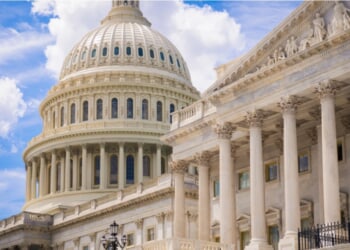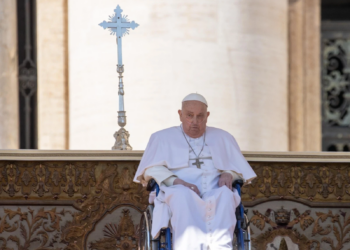As an old political science professor speaking to law-school oriented Federalist Society students, I had long offered a course labeled “The Real Constitution” to distinguish mine from the one taught in law schools. Recently, the title attracted two Federalist chapter leaders who revealed in their questioning to me just how challenging today’s law schools are for conservative students.
Their questions started with, “Do you believe that a sitting president should take aggressive action to curb the influence of Congress and the courts, or should he work within existing constitutional boundaries?” Apparently, those boundaries are ones set by today’s law professors and court justices, not the boundaries set by Andrew Jackson or Donald Trump.
The next question asked: “Should lower-level courts have the power to impose nationwide injunctions on national issues?” Well, no Constitutional or Congressional law grants such a power, and the related legal justifications do not come from actual court decisions. Moreover, the idea that San Francisco and Washington, D.C. courts can delay executive action for a year or so for Supreme Court review (perhaps after a newly elected Congress) guarantees that bureaucrats in robes can assure nothing new or corrective will ever get done by the executive branch. Fortunately, the Supreme Court just somewhat limited such lower-level injunctions. (RELATED: Shooting Blanks From the Bench)
Then: “Do you believe Trump’s executive orders (e.g., on immigration or federal funding) were necessary to bypass legislative inaction, or did they set a precedent for expanding executive power?” Of course, executive orders have expanded executive power for many years and are not unique to President Trump. They are not self-executing, can be overturned by Congress, and are often voided by the next president’s executive orders. And by the time such requests reach down, five of the 50-plus levels below the secretary, the bureaucracy pretty much decides the details anyway. Executive orders at least attempt some change. When I was Ronald Reagan’s director of the U.S. Office of Personnel Management, the president cut 100,000 permanent civil service positions by executive order under a law passed by Jimmy Carter.
And finally, “Should a sitting or former president be immune from criminal prosecution for official acts, or would that create a dangerous precedent for executive overreach? Do you think the judiciary overstepped in cases against Trump, or was it exercising its constitutional role? Do you think Trump should have complied with congressional subpoenas for documents and testimony, or was he right to assert executive privilege?”
My response was that aspects of the judiciary did overreach, but the bureaucracy did so even more, especially the intelligence and FBI agencies, and it is still not clear why the special intelligence courts did little about it. Trump should and will try to do more because governmental stasis is everywhere, and he wants change. But it is questionable whether Congress or the courts, or the bureaucracy will let him do so. If presidents did not have immunity, every future president would end up in jail, or at least in court, forever. Actually, a president is free to exert executive privilege, but Congress clearly has the Constitutional right to impeach him, which it did several times for Trump in his first term and could do so again after the 2026 election. (RELATED: Dictatorship of Obama Judges)
The conventional law school version of the Constitution is by no means limited to law schools. Wall Street Journal editor James Taranto has written an insightful comparison between what he describes as a “resonance” as opposed to a “concert” emerging between today’s executive and legal institutions in the persons of Chief Justice John Roberts and President Donald Trump — especially regarding their views on business regulation, the federal bureaucracy, civil rights, and freedom of expression. It is an interesting and provocative piece with many insights.
But even this imaginative reconciliation accepts the law-school version when Taranto summarizes the powers under the Constitution as Congress writes the laws, the president gives “effect to the law,” and the judiciary provides “the authoritative reading” of the Constitution. But Yale political scientist Robert Dahl taught my generation better — that the Constitution creates a separation of powers government, where no one institution is supreme over the rest.
Specifically, Dahl demonstrated that Congress throughout its history has “overruled” scores of Supreme Court decisions, which he cited by name. While not adding the Alien and Sedition Act because it did not reach the Supreme Court directly, it did reach the Chief Justice. And both Presidents Thomas Jefferson and James Madison considered it unconstitutional and overruled it. More recently, the Civil Rights Act of 1987 specifically overruled the Supreme Court’s Grove City v. Bell civil rights decision. (RELATED: Elephant in the Courtroom)
Andrew Jackson, of course, not only refused to enforce the Supreme Court’s Worster v. Georgia decision, but specifically argued that all three branches equally interpret the Constitution. Even Abraham Lincoln questioned whether the Dred Scott decision was Constitutional as early as 1857. It took a Civil War between the states for him to overrule the Supreme Court in his Emancipation Proclamation, which was confirmed by the 13th Amendment. (RELATED: The Judicial ‘Resistance’ Is Setting Itself Up for an Epic Smackdown)
Once reminded, it is clear that Congress, the president, and even the states check the Supreme Court. The judiciary does not have the authoritative interpretation. The Constitution is a separation of powers document that gives the last word to no one institution, which admittedly makes it very difficult to govern. The Founders knew this. As wise old Benjamin Franklin warned from the very beginning, it would be difficult to keep such a partitioned constitution. And with only one civil war, at least so far, that Constitution has probably already beaten the odds.
READ MORE from Donald Devine:
To Govern in Mankind’s Foreign Policy Interest or in Trump’s America First Interest?
Now the Hard Part: Defense, Intelligence, FBI, and Trump’s War on the Status Quo
DRAIN THE SWAMP Act’s Government Relocation Edict Could Have Dire Consequences for Conservatives
Donald Devine is a senior scholar at the Fund for American Studies in Washington, D.C. He served as President Ronald Reagan’s civil service director during his first term in office. A former professor, he is the author of 11 books, including his most recent, The Enduring Tension: Capitalism and the Moral Order, and Ronald Reagan’s Enduring Principles.





![Jasmine Crockett Justifies Mass Illegal Immigration With Bizarre Argument [WATCH]](https://www.right2024.com/wp-content/uploads/2025/03/1742007023_Jasmine-Crockett-Justifies-Mass-Illegal-Immigration-With-Bizarre-Argument-WATCH-350x250.jpg)

![NYC Tourist Helicopter Falls into Hudson River, Siemens Executive and Family Among Those Killed [WATCH]](https://www.right2024.com/wp-content/uploads/2025/04/NYC-Tourist-Helicopter-Falls-into-Hudson-River-Siemens-Executive-and-350x250.jpg)








